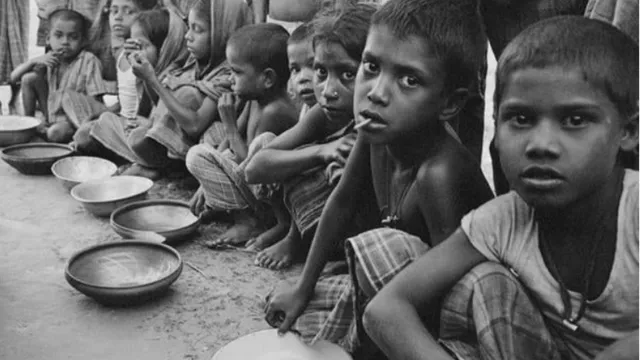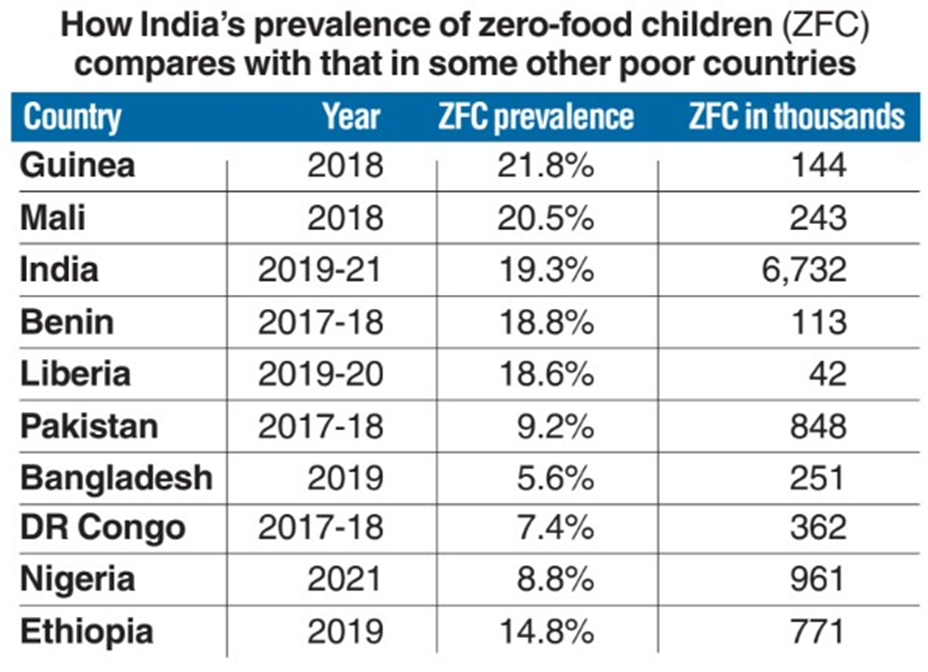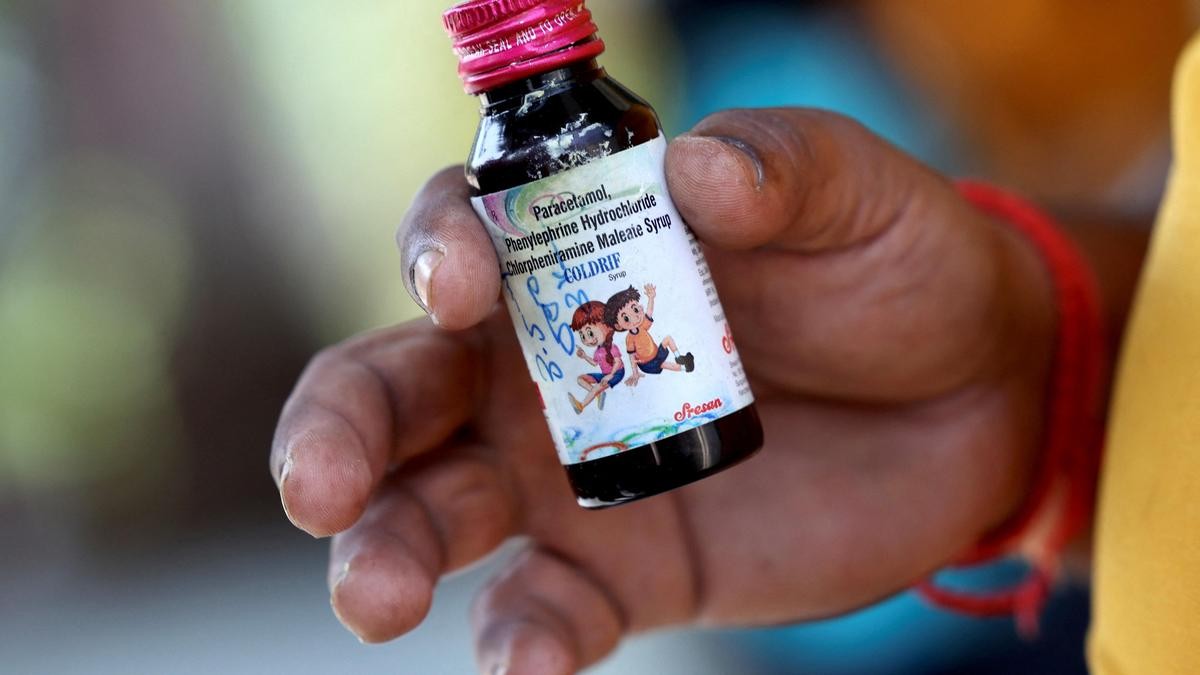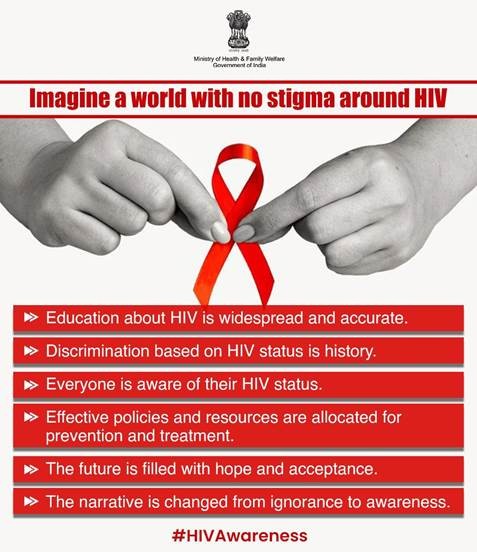Description

Copyright infringement not intended
Picture Courtesy: https://www.shethepeople.tv/news/zero-food-children-india-ranks-third-in-child-starvation-hunger-4273520
Context: India has the world's third-highest proportion of zero-food children (not eaten anything in the last 24 hours).
Details
- Recently a study report published in the journal JAMA Network Open studied 276,379 babies aged six to 23 months in 92 low and middle-income countries (LMIC).
- The study utilized data from the National Family Health Survey for 2019-2021, it found that nearly 19.3% of children in India experience zero-food days, meaning they have not eaten anything in the last 24-hour period.
- The study found that India ranked third highest globally, following Guinea (21.8%) and Mali (20.5%). The situation highlights the urgent need for interventions to address this issue.

Possible Reasons
Lack of food may not be the primary reason. Experts claim that these children may not be receiving adequate nutrition care due to a variety of factors:
Limited time for mothers
- Working mothers in low-income houses may not have enough time to prepare and feed their infants regularly. They frequently balance employment and domestic responsibilities, leaving them with little time for childcare.
- According to a study conducted by India's Centre for Economic Policy Research, many mothers in rural areas work long hours, which limits their time for childcare and meal preparation.
Inadequate Support Systems
- Maternity leave or childcare decisions may be placing the entire load on women. According to a World Bank analysis, India's maternity leave policy only provides for 26 weeks of paid leave, which may be insufficient for many mothers to establish good feeding practices and secure childcare before returning to work. This can be challenging for single mothers and those who lack family support networks.
Cultural Beliefs or inadequate Knowledge
- Certain cultural practices or a lack of information about the ideal newborn feeding could hamper proper nutrition. For example, certain cultures may prioritize breastfeeding for an extended period of time and postpone the introduction of complementary foods, even after six months, when breast milk alone is no longer sufficient to supply a child's nutritional requirements.
- A study published in the Maternal & Child Health Journal found that some mothers rely solely on commercially prepared baby food, which can be expensive and deficient in important nutrients, due to a lack of understanding about how to produce homemade alternatives.

Consequence
- Skipping meals or getting inadequate nutrition at the early developmental stage might have a serious effect on a child's health.
- Malnutrition, or a lack of essential nutrients, can weaken a child's immune system, making them more vulnerable to infections and illnesses. Another potential result in stunted growth, which occurs when a child's height or weight falls below the normal range for their age. This can have long-term consequences for a child's physical development, including affecting their future working capacity and overall well-being.
- Inadequate nutrition can also have a negative impact on brain development, reducing a child's intellectual capacity, learning potential and future academic success.
Way Forward
Strengthen Social Support Systems
- Providing mothers in need with extended maternity leave, affordable childcare options, or financial assistance can make a significant impact.
- Extended maternity leave provides mothers with extra time to develop breastfeeding routines and introduce supplementary foods.
- Affordable childcare facilities can ease the pressure on mothers who work outside the home by ensuring their children are properly fed throughout the day.
- Financial aid can help families facing food insecurity to acquire healthy foods for their children.
Promoting Nutritional Education
- Educating mothers on useful newborn and childhood diets is important. This can be achieved through community health initiatives, public awareness campaigns, or even educational materials supplied at healthcare facilities.
- Educational programs may educate women on the benefits of breastfeeding and the proper introduction of complementary foods, as well as provide advice on how to prepare healthy and age-appropriate meals for their children.
Upgrading Healthcare Systems
- Training healthcare workers to counsel women on infant feeding practices during pregnancy and following delivery might help them recognize potential difficulties and offer appropriate recommendations.
- Implementing programs to monitor children's growth and development and identify cases of malnutrition early on can ensure timely intervention and avoid serious health risks.
Conclusion
- The study recognizes potential factors contributing to zero-food children in India, a deeper understanding of the fundamental causes are necessary. More research can help identify the specific reasons behind time limitations, lack of support systems, or cultural practices that hamper proper feeding. A comprehensive understanding can lead to more targeted interventions that address the specific needs of different groups.
Must Read Articles:
WORLD FOOD DAY- ZERO HUNGER CHALLENGE: https://iasgyan.in/ig-uploads/pdf/6266316.pdf
REGIONAL OVERVIEW OF FOOD SECURITY AND NUTRITION 2023: STATISTICS AND TRENDS: https://www.iasgyan.in/daily-current-affairs/regional-overview-of-food-security-and-nutrition-2023-statistics-and-trends#:~:text=Over%2074%25%20of%20Indians%20struggled,the%20overall%20figure%20remains%20alarming.
|
PRACTICE QUESTION
Q. India has achieved self-reliance in cereal production, but still a significant percentage of the population suffers from malnutrition. Critically evaluate the limitations of contemporary food security measures and propose alternative strategies that address both the availability and accessibility of nutritious food.
|












